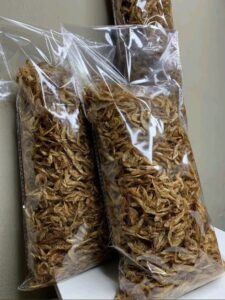Introduction
For Nigerians abroad, native food is more the best gift in the entire world (Quote me anywhere lol). From ogbono and egusi to pepper soup spice and stockfish, there’s always demand in the diaspora for that authentic taste of Naija.
Whether you’re sending garri to your cousin in Toronto, crayfish to your sister in London, or starting a food export hustle, you need to know how to ship foodstuff legally and safely from Nigeria to the US, UK, and Canada. This guide breaks it all down: what’s allowed, how to package, and the smartest way to ship.
Is It Legal to Ship Nigerian Foodstuff Abroad?
Yes, but with conditions. Each country has strict import laws to protect consumers and agriculture. The good news is that most Nigerian dry foods and spices are allowed if they’re properly packaged and declared.
Commonly Allowed Items:
- Garri (dry, well-packaged)
- Egusi and ogbono seeds (dry, not ground)
- Dried fish and stockfish (well-wrapped, odor-proof)
- Crayfish (sealed in airtight packaging)
- Nigerian spices and herbs (labeled and dry)
- Palm oil (usually not allowed in some countries unless refined and sealed)
Prohibited or Restricted Items:
- Fresh fruits and vegetables
- Wet or semi-processed foods
- Open/unsealed packages
- Palm oil (banned in Canada and sometimes restricted in the US/UK due to leakage and customs rules)
Always double-check with the FDA (US), DEFRA (UK), or CFIA (Canada) for updated rules.
Step-by-Step Guide to Shipping Foodstuff Abroad
Step 1: Pick the Right Food Items
Focus on foods that:
- Have a long shelf life
- Are properly dried
- Won’t spoil in transit
- Are legally permitted at destination
Step 2: Package Like a Pro
This is where many people miss it. Bad packaging leads to spoilage, rejection at customs, or even confiscation.
Packaging tips:
- Use vacuum-sealed or airtight bags.
- Double-wrap (foil or thick plastic before bagging).
- Label clearly (e.g., “Ground Ogbono – Not for resale”).
- Add silica gel to reduce moisture.
- Use sturdy cartons or food-grade containers.
- Tape edges firmly and use bubble wrap for extra protection.
Very important: Don’t mix foodstuff with electronics or fragile goods. If, worst case, customs needs to dispose of spoiled food, only that food package will go — not your entire shipment. Keeping food separate protects your other items.
For business exports, go professional: branded packaging, barcodes, and nutrition labels (required in the US/UK).
Packaging Tips:
- Use vacuum-sealed or airtight bags
- Use aluminum foil or double-layer plastic before bagging
- Label contents clearly (e.g., “Dried Ground Ogbono – Not for resale”)
- Add silica gel for moisture control
- Use sturdy cartons or food-grade plastic containers
- Reinforce edges with tape and wrap with bubble wrap for protection
If you’re shipping large quantities for resale, consider using branded, barcoded labels and nutrition facts (for the US and UK).
Step 3: Handle Documentation
Depending on your shipment size, you may need:
- Invoice or packing list (even for gifts)
- Export permit (commercial quantities)
- Health or phytosanitary certificate (if required)
- Receiver’s full name, address, and phone number
- Food declaration for customs
If you’re going commercial, register with NAFDAC and NEPC to be fully compliant.
Step 4: Pick a Trusted Shipping Company
This part can make or break your export. You need a partner that knows foodstuff, not just general cargo.
Afroshipper has proven to be Specialists in foodstuff export. Ships to US, UK, Canada with affordable rates and door-to-door delivery. Even offers WhatsApp and Instagram support for speedy communication.
With AfroShipper, you also get extra guidance on packaging, customs, and delivery, so you don’t have to guess.
Step 5: Select a Shipping Method
There are 3 main ways to ship foodstuff abroad:
1. Air Freight
- Fast (3–7 days)
- Ideal for perishables
- More expensive
- Often used by Afroshipper, DHL, Topship
2. Sea Freight
- Cheaper, especially for bulk
- Slower (4–6 weeks)
- Requires careful packaging and labeling
- Available for larger shipments
3. Courier (Door-to-door)
- Ideal for small parcels
- Fast and convenient
- Includes customs and delivery
For foodstuff, air freight or courier is recommended for quality preservation.
Step 6: Track Your Shipment
Always choose a logistics partner with real-time tracking. AfroShipper even updates you on WhatsApp, so you can monitor your food parcel’s journey in real time.
Cost of Shipping Foodstuff from Nigeria to Abroad
Costs depend on:
- Weight/volume
- Destination country
- Shipping method (air vs sea)
- Speed (express or economy)
Average Price Ranges:
| Country | 5kg Parcel | 10kg Parcel | 20kg Parcel |
|---|---|---|---|
| USA | ₦30,000–₦40,000 | ₦50,000–₦65,000 | ₦90,000–₦120,000 |
| UK | ₦25,000–₦35,000 | ₦45,000–₦55,000 | ₦85,000–₦100,000 |
| Canada | ₦35,000–₦50,000 | ₦60,000–₦80,000 | ₦110,000–₦150,000 |
Can You Ship Food Items as a Business?
Yes! Nigerians abroad crave authentic ingredients. To do this right:
- Register with NAFDAC & NEPC.
- Package professionally (labels, dates, batches).
- Follow food safety standards.
- Partner with reliable logistics providers.
Many small exporters now sell spices and packaged food on Etsy, diaspora stores, and even their own websites.
Afroshipper: Your Food Export Partner
AfroShipper has helped hundreds of Nigerians send foodstuff abroad — safely, legally, and affordably.
Why choose AfroShipper?
- Food export expertise
- Affordable rates
- Door-to-door delivery to US, UK, Canada
- Customs guidance for food shipments
- Dedicated WhatsApp support
Whether it’s a small 5kg bag of garri for family or a bulk order for resale, AfroShipper makes sure it lands without stress.
Visit: AfroShipper
Final Word
Shipping foodstuff from Nigeria to the US, UK, and Canada is very possible — but it must be done right. Package properly, separate food from electronics, get the paperwork sorted, and choose a trusted partner like AfroShipper.
Start small, test the process, and grow from there. The diaspora is hungry, and AfroShipper is here to help you share the taste of home.






